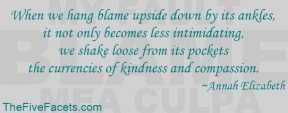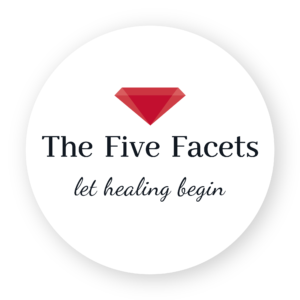
In her essay A Hard Look is in Order, D.A. Wolf lays bare one of the simplest yet most profound things we can do to grow: reflect and seek knowledge, clarity, and understanding.
“Maybe what I ought to be doing is the sort of discovery process that is enhanced by asking questions — from me to me — questions that lay bare my motivations, my insecurities… so I may capitalize on the former and overcome the latter.”
In her reflection of a New York Times article, the author uses the phrase mea culpa, translated as “through my fault” or the acceptance of blame.
Those words carried me away from Wolf’s evaluation and into my own thoughts with regard to blame.
How often do we enter into that I can’t believe I did that adverse thinking and beating ourselves up over missteps or mistakes?
What a stupid thing to do.
What a fuck-up.
I can’t do anything right.
Haven’t we all been there at one time or another?
That sort of thinking is abusive, self-defeating, and void of compassion.
That derogatory thinking creates misery, fear, and prevents us from living our best life.
There are, however, valuable lessons in acknowledging and contemplating our lapses in judgement and behavior.
And there are, as Wolf suggests, countless ways in which we can evaluate our actions and thoughts in compassionate and meaningful ways.
“For me, introspection is a helpful tool when things aren’t going right, and equally (though we do it less), when they are. We could all do with a good hard look in the mirror when it comes to what we’re doing, why we’re doing it, and how.”
Introspection is a healthy, kind, and encouraging means of moving us forward in achieving our hopes and dreams.
How do I feel about what has happened?
Where does my accountability lie?
What lessons (growth) can I take away from this event?
What can I do differently to achieve a different result in future situations?
And, as Wolf so accurately points out, there is great value to reflecting on those instances where things have gone right, to accepting responsibility for our part in something successful.
We have other names for blame turned inside out.
Praise.
Extol.
Speak well of.
When we hang blame upside down by its ankles, it not only becomes less intimidating, we shake loose from its pockets the currencies of kindness and compassion.
What do you think, Journeyer, join me in a different sort of blame game?
Until we meet again, yours in hope, healing, and happiness,


6 Comments on “Healing and the Two Sides of Blame”
Learning to be compassionate to ourselves is one of the most important and yet most difficult things to learn. And sometimes we have to keep reteaching ourselves the lesson. Well said Annah…Both you and DA Wolf are very wise.
Ah, Liv! “…sometimes we have to keep reteaching ourselves the lesson…” THANK YOU FOR THAT REMINDER TO KEEP REMINDING MYSELF! LOL There are so many traits in life that we do keep relearning, aren’t there? One would think it would be self evident after awhile… Always enjoy your thoughts and reflections! <3
I’m very guilty of blaming myself for every little thing that goes wrong. I’m a compassionate person with everyone else but myself! I love this idea of trading the blame for introspection and growth. Thanks for a great post!
Hi, Lana! Have you ever wondered why that is…why some of us who offer up so much compassion for others tend to withhold the same for ourselves? It is a bit of a conundrum, isn’t it? But we can change that, can’t we? Let’s work hard to keep encouraging others to trade blame for introspection and growth! <3
I like that you approached the topic of negative self talk in a way that showed both compassion and critical thinking. I’m very glad that you’re a part of #1000Speak.
Thank you, Tamara! Thank you for your participation in #1000speak, for reading and commenting and working to make the world a more compassionate place.